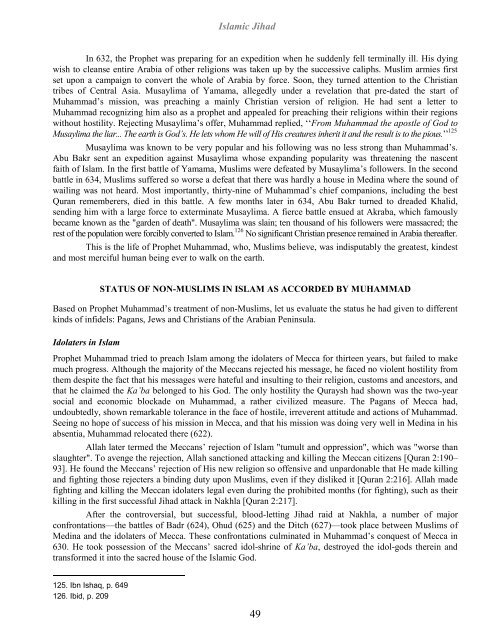islamic-jihad-legacy-of-forced-conversion-imperialism-slavery
islamic-jihad-legacy-of-forced-conversion-imperialism-slavery
islamic-jihad-legacy-of-forced-conversion-imperialism-slavery
- No tags were found...
You also want an ePaper? Increase the reach of your titles
YUMPU automatically turns print PDFs into web optimized ePapers that Google loves.
Islamic JihadIn 632, the Prophet was preparing for an expedition when he suddenly fell terminally ill. His dyingwish to cleanse entire Arabia <strong>of</strong> other religions was taken up by the successive caliphs. Muslim armies firstset upon a campaign to convert the whole <strong>of</strong> Arabia by force. Soon, they turned attention to the Christiantribes <strong>of</strong> Central Asia. Musaylima <strong>of</strong> Yamama, allegedly under a revelation that pre-dated the start <strong>of</strong>Muhammad’s mission, was preaching a mainly Christian version <strong>of</strong> religion. He had sent a letter toMuhammad recognizing him also as a prophet and appealed for preaching their religions within their regionswithout hostility. Rejecting Musaylima’s <strong>of</strong>fer, Muhammad replied, ‘‘From Muhammad the apostle <strong>of</strong> God toMusaylima the liar... The earth is God’s. He lets whom He will <strong>of</strong> His creatures inherit it and the result is to the pious.’’ 125Musaylima was known to be very popular and his following was no less strong than Muhammad’s.Abu Bakr sent an expedition against Musaylima whose expanding popularity was threatening the nascentfaith <strong>of</strong> Islam. In the first battle <strong>of</strong> Yamama, Muslims were defeated by Musaylima’s followers. In the secondbattle in 634, Muslims suffered so worse a defeat that there was hardly a house in Medina where the sound <strong>of</strong>wailing was not heard. Most importantly, thirty-nine <strong>of</strong> Muhammad’s chief companions, including the bestQuran rememberers, died in this battle. A few months later in 634, Abu Bakr turned to dreaded Khalid,sending him with a large force to exterminate Musaylima. A fierce battle ensued at Akraba, which famouslybecame known as the "garden <strong>of</strong> death". Musaylima was slain; ten thousand <strong>of</strong> his followers were massacred; therest <strong>of</strong> the population were forcibly converted to Islam. 126 No significant Christian presence remained in Arabia thereafter.This is the life <strong>of</strong> Prophet Muhammad, who, Muslims believe, was indisputably the greatest, kindestand most merciful human being ever to walk on the earth.STATUS OF NON-MUSLIMS IN ISLAM AS ACCORDED BY MUHAMMADBased on Prophet Muhammad’s treatment <strong>of</strong> non-Muslims, let us evaluate the status he had given to differentkinds <strong>of</strong> infidels: Pagans, Jews and Christians <strong>of</strong> the Arabian Peninsula.Idolaters in IslamProphet Muhammad tried to preach Islam among the idolaters <strong>of</strong> Mecca for thirteen years, but failed to makemuch progress. Although the majority <strong>of</strong> the Meccans rejected his message, he faced no violent hostility fromthem despite the fact that his messages were hateful and insulting to their religion, customs and ancestors, andthat he claimed the Ka’ba belonged to his God. The only hostility the Quraysh had shown was the two-yearsocial and economic blockade on Muhammad, a rather civilized measure. The Pagans <strong>of</strong> Mecca had,undoubtedly, shown remarkable tolerance in the face <strong>of</strong> hostile, irreverent attitude and actions <strong>of</strong> Muhammad.Seeing no hope <strong>of</strong> success <strong>of</strong> his mission in Mecca, and that his mission was doing very well in Medina in hisabsentia, Muhammad relocated there (622).Allah later termed the Meccans’ rejection <strong>of</strong> Islam "tumult and oppression", which was "worse thanslaughter". To avenge the rejection, Allah sanctioned attacking and killing the Meccan citizens [Quran 2:190–93]. He found the Meccans’ rejection <strong>of</strong> His new religion so <strong>of</strong>fensive and unpardonable that He made killingand fighting those rejecters a binding duty upon Muslims, even if they disliked it [Quran 2:216]. Allah madefighting and killing the Meccan idolaters legal even during the prohibited months (for fighting), such as theirkilling in the first successful Jihad attack in Nakhla [Quran 2:217].After the controversial, but successful, blood-letting Jihad raid at Nakhla, a number <strong>of</strong> majorconfrontations—the battles <strong>of</strong> Badr (624), Ohud (625) and the Ditch (627)—took place between Muslims <strong>of</strong>Medina and the idolaters <strong>of</strong> Mecca. These confrontations culminated in Muhammad’s conquest <strong>of</strong> Mecca in630. He took possession <strong>of</strong> the Meccans’ sacred idol-shrine <strong>of</strong> Ka’ba, destroyed the idol-gods therein andtransformed it into the sacred house <strong>of</strong> the Islamic God.125. Ibn Ishaq, p. 649126. Ibid, p. 20949


